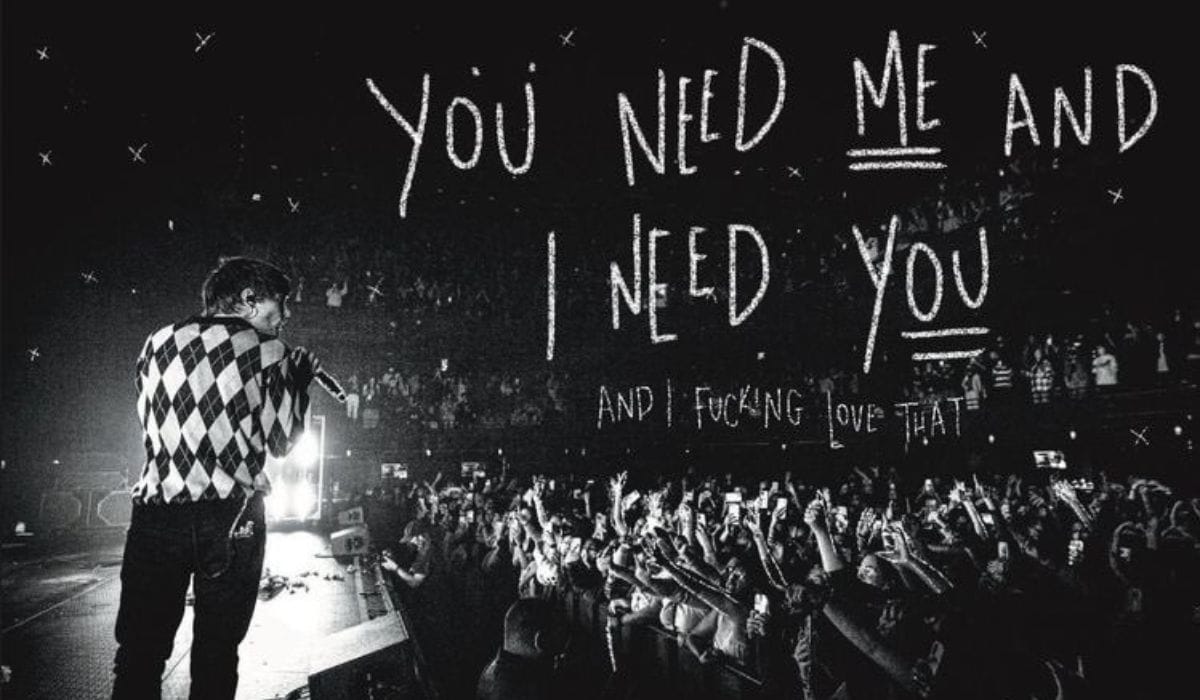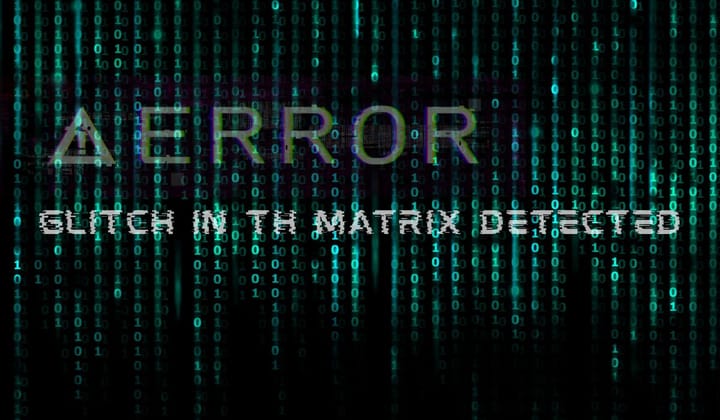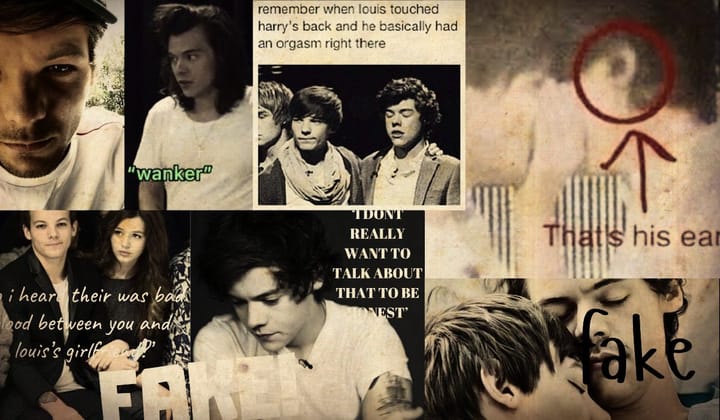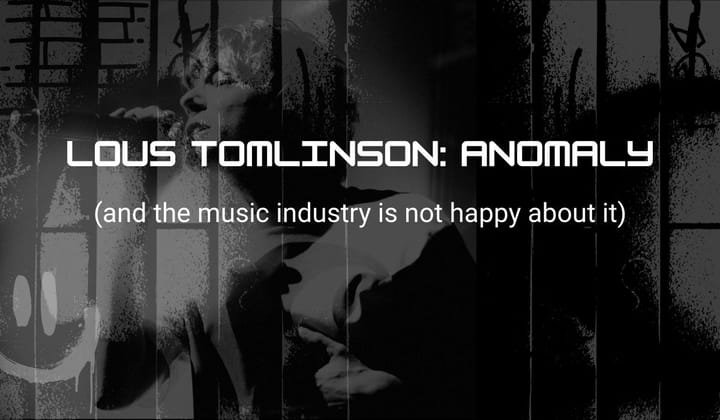Beyond the Hiatus: The Invisible War on the One Direction Fandom
The One Direction fandom was a dynasty. It used to hold a massive power, but it has been systematically broken up for years now. Things are simply not the same as they were 15 or even 3 years ago. Will the fans adapt, or will they leave?

The One Direction fandom was a dynasty. It used to hold a massive power, but it has been systematically broken up for years now. Simon Cowell and Sony were not just manipulating the Larry narrative (STOP! It DOESN’T MATTER whether it's true or not! NOT the point! Read my other recent posts about Simon Here we go Again and Part 2 Simon Spots a Hook.
But as AI technology progressed and the need for better control over this fandom grew, that technology was used to break it up slowly and subtly. And it wasn't just about breaking up the One Direction fandom, which was transforming anyway because of their solo career directions and very different music styles. It was about getting control for the long term of fandoms and musicians as a whole.
Things had shifted a lot in 10 years with technology and the music scene. The industry was in massive transition between 2010 and 2020. Some of the newer people here may not know but here are a few things going on at the time.
- The transition model from physical media ownership to streaming services is a big one. Music discovery moved from radio DJs and friends to algorithmic and editorially curated playlists (like Spotify's "Discover Weekly" or "RapCaviar").
- Getting placed on a major playlist could break an artist in overnight. This gave streaming platforms enormous power over what music became popular, shifting influence away from traditional record labels and radio.
- With recorded music revenue from sales collapsing, labels sought new ways to profit from artists. This led to the rise of the "360 deal," where a label takes a percentage of all an artist's income, including touring, merchandise, and endorsements, in exchange for a larger advance.
- Artists themselves became less reliant on album sales and more on touring, branding, sync licensing (placing songs in movies, TV and ads), and direct-to-fan engagement via social media to generate income.
- Platforms like Twitter, Instagram, and later TikTok became essential marketing tools. Artists could build a fanbase directly without traditional media gatekeepers.
- Fan engagement became constant and intimate. A viral moment on social media (e.g., a dance challenge on TikTok) could propel a song to global success faster than any traditional marketing campaign.
Do you think the industry took this sitting down? They were fighting for their lives and their greed. Did you know UMG CEO Lucian Grainge received a 2023 compensation package valued at approximately $128 million?
But today in 2025 this is already shifting again. You might check out these articles from Rolling Stone: The Role of AI In Modern Composition (Oct 2024), or The Weird Rise of AI Music (June 2023). Bottom line, the need for labels and the industry as a whole to keep up with what's going on in the minds (and pockets) of fans is more intense than ever. There is a need now to do a deep dive into individual or closely monitored funneled segments. It is not just about getting data like Spotify playlists and birthdays. It is doing behavioral tracking to make predictions on everything from song releases to tour locations to marketing campaigns and buying habits.
This is one of the reasons why Discord is useful because it filters out the noise and gets down to specific details that the industry wants to know. So if you're just on Discord to make a bunch of noise and complain, they'll just kick you off because you're disrupting the data set. It is literally not personal!
>>> More important - But while Discord is collecting specific funneled segmented data, X Twitter is manipulating content and amplifying voices (hate content feeds on itself). And THAT is what has been killing the One Direction fandom. It's not the metrics from Discord, it’s the emotional quotient on X and TikTok.
In 2010, Sony Music's manipulation would have likely been a manually orchestrated, labor-intensive effort involving PR firms, simple bots, industry plants on all platforms (particularly Twitter-X and Tumblr), and strategic advertising.
So, while the foundational technologies of AI were developed many years ago, AI technology for the masses, specifically in the form of autonomous agents manipulating social platforms, truly began to take hold in early 2023. This was primarily driven by the release of ChatGPT plugins and, crucially, the open-source explosion around projects like AutoGPT and AgentGPT, which democratized access to AI agent capabilities that were previously confined to tech giants and research labs.
From an industry perspective it's about managing a large group of fans. They need to understand the fans in order to understand the money flow and how to manipulate the artist as well. I believe this shift into advanced manipulation tactics (in general but I'm specifically speaking to the One Direction fandom) started during LOT (Harry Styles Love on Tour). Why at that time? There are two primary reasons, but I can think of a couple of others. First, that was the time when technology made a major leap in terms of AI and its ability to manipulate very creatively and subtly on all platforms particularly X. AI became very good at learning, mirroring and manipulating fans depending on how the program was written. Whatever the program, it was so good that most people would not be able to detect if they were talking to AI or another person.
Second that's when we began to see so many coincidences that weren't exactly. Fans may have believed something was a coincidence, but was it? There were many things done by AI that looked like both coincidences and contradictions. It's this back and forth shift that's important. The AI (and industry plants) manipulation is designed to be confusing to keep people off balance and includes things like story shifts and contradictions.
That is how you manipulate ANY large group (and this holds for politics as well!). The better the technology got with agents in 2023 the easier (and faster) it was to achieve a goal.
And this is where I take a deep breath, because what's happening now has been so dramatic and different from anything in the past.
I said there was a war on this fandom. But why? Because it had become too powerful and unpredictable. Although the music industry is all about money and its musicians just assets/ products, above all else they need power. As I've dug deeper into the background of this group and researched the changes in the past 10 years, I believe it to be the first significantly manipulated band in history. But it wasn't just the band, it was its fans. And this manipulation went on past the hiatus until now, when we are seeing the destruction of it that has been occurring over the past couple of years.
Because of how it started and the technology that evolved during its rise, the hiatus at its peak, the stories that arose from it, the age of fans and global demographics, and the after-effects of the solo careers, it continued to be a natural testing environment for the music industry.
Where are we now 2023 - 2025?
Harry Styles has a ton of fans but outside of the 1D fandom they are somewhat disjointed and fickle. But even with that, his fans are more predictable due to the specific and massive amount of media coverage about him over the last many years. The industry knows who his fans are and how to promote and manipulate them because the message has been consistent. I'm not saying the message has been correct, I'm only saying it's been consistent.
Niall’s fans are also more predictable loving his typical low drama, throwback, easy-listening style. Zayn too, has a different but predictable fanbase known to be quieter, with fans expressing a deep appreciation for his musical talent rather than public interaction.
Liam had announced a second album and a return to touring. But things were not going well. Instead of his music and his struggles, the media stories were driven by his private life. We were watching as the industry focused on things that would dismantle his career. This was no accident. And by that, I mean the narrative flow was not an accident, it was manipulated. So, his fans began to leave, then his management changes course, and his record doesn't move forward. Suddenly there's a questionable book from a former girlfriend, and a whole new round of stories to confuse and create chaos. Then in October 2024, he has a mysterious fall to his death that is still suspicious and unresolved in the minds of his fans today.
Finally, we have Louis. The last of the uncontrolled One Direction fandom power is held with his super loyal, extremely protective, and very verbal fans. During the days of the band, he was the one considered a bit too sassy with a few too many opinions that didn't agree with management. He’s known to be outspoken and so are his fans. He also had a highly successful recent tour without a lot of backing from the industry. He did it without the heavy management that the others had, and the industry hates being left out of the money train.
Although there may be multiple things going on behind the scenes that currently, from this perspective, we don't understand, it is clear that his fan base is being challenged and driven to division. Louis's fanbase is like no other. Read: Lous Tomlinson: Anomaly. They are wildly diverse, crossing age and gender demographics, and have been the most difficult to understand, let alone control.
For the fans who are feeling angry and attacked, I can only remind them that the music industry has its own agenda and with that, a dark side. It is not an industry of fairness and love for its assets. Through all this I hope his fans remain loyal because, inside, he hasn't changed but the industry has in the way it now manipulates and exploits artists and their fans.
For now, we're keeping an eye on where that's going, and I suspect I'll be back to write more about the outcome.



